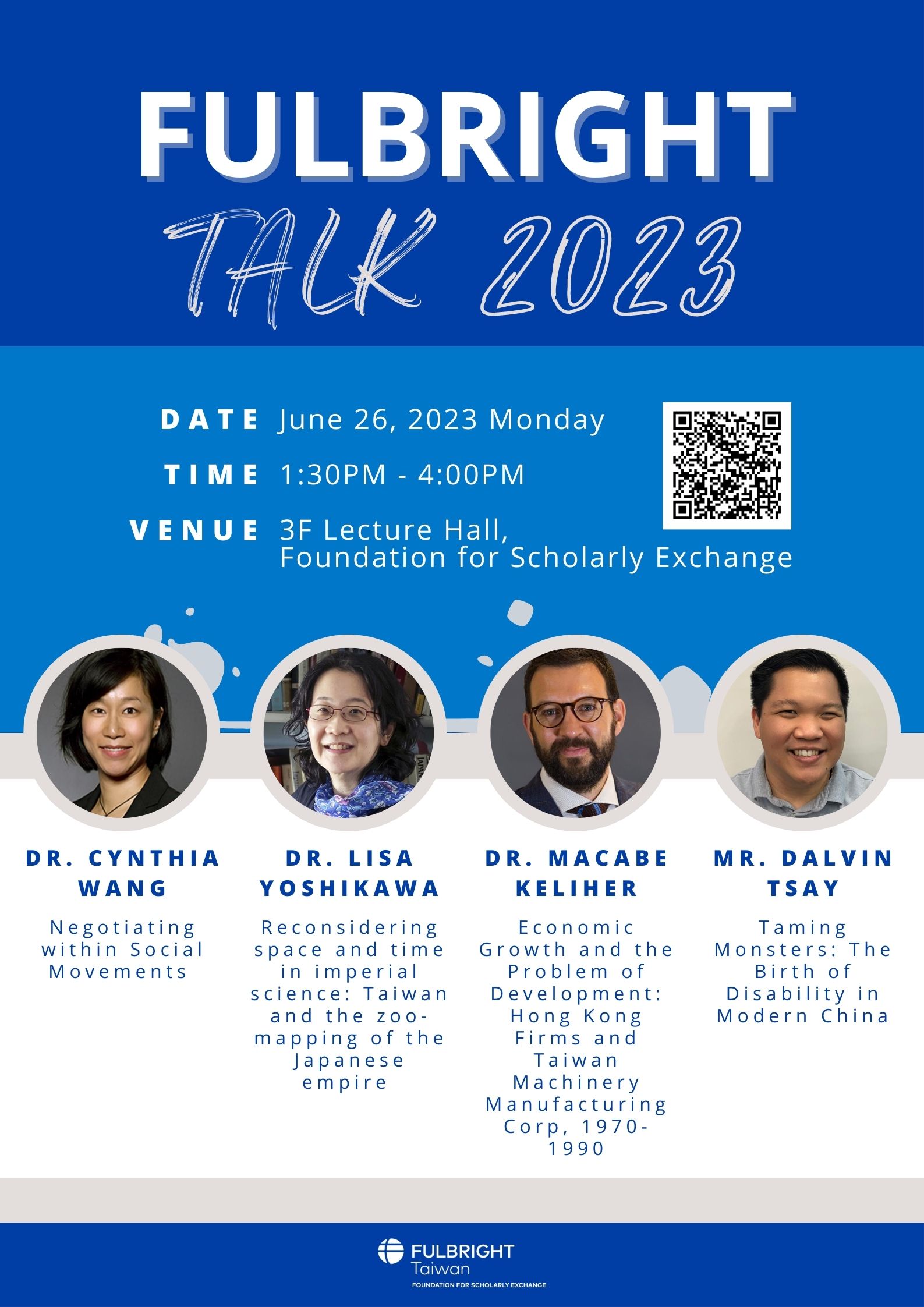This June, Fulbright Taiwan will host another Fulbright Talk, a forum that invites various scholars, researchers, and professionals from our 2022-2023 U.S. grantees. They will share their excellent research and unique living experiences during their granted period in Taiwan.
The topics of this forum include “Negotiating within Social Movements,” “Reconsidering Space and Time in Imperial Science: Taiwan and the Zoo-mapping of the Japanese Empire,” “Economic Growth and the Problem of Development: Hong Kong Firms and Taiwan Machinery Manufacturing Corp, 1970-1990,” and the “Taming Monsters: The Birth of Disability in Modern China.” Our distinguished scholars and fellows will talk about their professional and innovative ideas during the event.
[WHEN]
1:30-4:00 PM, Monday, June 26, 2023
[WHERE]
3F Lecture Hall, Foundation for Scholarly Exchange
[ONLINE REGISTRATION]
See the following button.
Content
Dr. Cynthia Wang: Negotiating within Social Movements
Cynthia Wang is the Executive Director of the Dispute Resolution and Research Center and a Clinical Professor of Management and Organizations at Northwestern University’s Kellogg School of Management. She is currently a Fulbright Senior Scholar at Academia Sinica in Taiwan. She teaches negotiations at Kellogg and her research interests fall in the area of cultural and social diversity, political polarization, and negotiations. She publishes in research outlets such as Science and Organization Science and her work has received attention from media outlets such as Time Magazine and Scientific American. She is currently President of the International Association for Conflict Management.
Social movements live and die based on the ability of activists to mobilize individuals to achieve their goals. Negotiating with others is therefore a critical part of the activist tactical repertoire. Building from the interests, rights, and power (IPR) dispute resolution framework within the negotiations literature, I suggest that activists build consensus to unlock negotiation capabilities. In interviews with activists in Taiwan, I illustrate that successfully building these collective capabilities depends on activists’ consideration of the IPR facets: clarifying interests, building power, and developing rights. Possessing these collective capabilities allows activists flexibility when negotiating with decision-makers external to the movement.
Dr. Lisa Yoshikawa: Reconsidering Space and Time in Imperial Science: Taiwan and the Zoo-mapping of the Japanese Empire
Lisa Yoshikawa is Professor of History and Asian Studies at Hobart and William Smith Colleges, and currently a Visiting Researcher at Academia Sinica, Institute of Taiwan History. She studies Japanese empire’s knowledge production, science, and environment, and is working on two book projects: on historical zoo-mapping and coral research. Her recent publications include “From Colonial Science to the Genome age: The Politics of Asian Giant Salamander Conservation” (Routledge, 2023), “Diluvial Nation: Building Imperial Japan Through Floods.” Disaster Management and Prevention (2021), and Making History Matter: Kuroita Katsumi and the Construction of Imperial Japan (Harvard 2017; e-book Brill 2020).
Colonial Taiwan and its scientists were crucial in the development of Imperial Japan’s zoology, based in experiment stations including those for agriculture, silviculture, and aquaculture, and later the Taipei Imperial University. By the 1910s, the empire’s scholars were traveling in the realm, and academic cross-fertilization abound in training and in scholarly production, as many imagined the empire as an entity and took advantage of the vast laboratory. Their works also often affirmed the politically constructed space, similarly to how scholars manipulated temporality to delineate their positionality as colonizers and as scientists. My talk discusses aspects of such zoo-mapping in Taiwan.
Dr. Macabe Keliher: Economic Growth and the Problem of Development: Hong Kong Firms and Taiwan Machinery Manufacturing Corp, 1970-1990
Macabe Keliher is associate professor of History at Southern Methodist University and author of the award winning book The Board of Rites and the Making of Qing China. He is currently working on a multi-part history of China’s political economy from the Ming to the present. This year he is a Fulbright Senior Scholar in Taiwan researching postwar East Asian economic development with a focus on the network of business relations between Taiwan and Hong Kong firms.
Postwar East Asia experienced some of the fastest economic growth in the developing world. While scholars have focused on government initiatives to explain this phenomenon, Hong Kong’s lack of a developmental state remains an outlier. Drawing on state and firm archival records, this talk examines the period of Hong Kong’s industrial diversification in the 1970s and 1980s and offers an explanation of manufacturing development and efficiency, arguing that Hong Kong firms turned to Taiwan state-owned enterprises to acquire advanced equipment and know-how. The talk looks closely at Taiwan Machine Manufacturing Co and its relationship with Hong Kong firms to supply them with more advanced technology and increase their productivity.
Mr. Dalvin Tsay: Taming Monsters: The Birth of Disability in Modern China
My name is Dalvin Tsay, a Ph.D. candidate in the Department of History at the University of North Carolina-Chapel Hill. My research at the Academia Sinica examines the history of disability in modern China, with particular attention paid to the formation of knowledge in the late-nineteenth and twentieth centuries. As a differently-abled American of Taiwanese descent, mine is a bimodal work of both academic history and disability rights advocacy. I very much hope to inspire new ways of thinking, seeing, and doing which lead to greater inclusivity for the differently-abled in the Sinosphere and across the world.
This presentation will provide an overview of my dissertation research conducted over the past nine months. It will begin with an outline of my central research questions, followed by an explanation of the various historical source material used in my project. Ultimately, I aim to show how sources ranging from court memorials, to medical journalism, to disability rights narratives collectively trace a conceptual evolution of disability in modern China.


